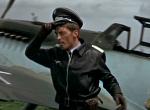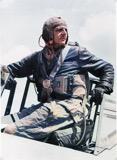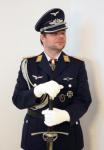Deprecated: Kunena\Forum\Plugin\Kunena\Comprofiler\KunenaAccessComprofiler::loadCategoryRoles(): Implicitly marking parameter $categories as nullable is deprecated, the explicit nullable type must be used instead in /mnt/web007/e3/36/52020636/htdocs/plugins/kunena/comprofiler/KunenaAccessComprofiler.php on line 228
heutige Warbirds
- Lebano
-
 Offline
Autor
Offline
Autor
- Beiträge: 3871
- Dank erhalten: 4193
Es gibt zwei überaus tolle Neuigkeiten!
1. Die erste kam für mich völlig überraschend aber sehr willkommen. Es wird wieder ein Hahnweide Oldtimerfliegertreffen in 2019 geben! Näheres hier: www.oldtimer-hahnweide.de/home.php
2. Die G-14 vom Hangar 10 in Heringsdorf hatte am 14.07 ihren Erstflug mit Klaus Plasa am Steuer. Ich hatte die Gelegenheit beim Lauterbach Fly-In mit ihm über die 109 Fliegerei zu sprechen. Sehr spannend. Gerne mehr am Geschwadertreffen. Hier ein Video vom Erstflug:
1. Die erste kam für mich völlig überraschend aber sehr willkommen. Es wird wieder ein Hahnweide Oldtimerfliegertreffen in 2019 geben! Näheres hier: www.oldtimer-hahnweide.de/home.php
2. Die G-14 vom Hangar 10 in Heringsdorf hatte am 14.07 ihren Erstflug mit Klaus Plasa am Steuer. Ich hatte die Gelegenheit beim Lauterbach Fly-In mit ihm über die 109 Fliegerei zu sprechen. Sehr spannend. Gerne mehr am Geschwadertreffen. Hier ein Video vom Erstflug:
 |
| Major 'Lebano' Stabsangehöriger Geschwaderstab / JG4 |
von Lebano
Folgende Benutzer bedankten sich: Pega, Thorwald, Goddee
Bitte Anmelden oder Registrieren um der Konversation beizutreten.
- Lebano
-
 Offline
Autor
Offline
Autor
- Beiträge: 3871
- Dank erhalten: 4193
Und hier ein Überblick über die 109 Projekte vom Hangar 10:
 |
| Major 'Lebano' Stabsangehöriger Geschwaderstab / JG4 |
von Lebano
Folgende Benutzer bedankten sich: Pega, Matthias, Goddee
Bitte Anmelden oder Registrieren um der Konversation beizutreten.
- Dostal_W44
-

- Dank erhalten: 0
Ju52 Absturz in den Schweizer Alpen
www.aerotelegraph.com/ploetzlich-kippte-die-ju-52
www.aerotelegraph.com/ploetzlich-kippte-die-ju-52
von Dostal_W44
Bitte Anmelden oder Registrieren um der Konversation beizutreten.
- Lebano
-
 Offline
Autor
Offline
Autor
- Beiträge: 3871
- Dank erhalten: 4193
 |
| Major 'Lebano' Stabsangehöriger Geschwaderstab / JG4 |
von Lebano
Folgende Benutzer bedankten sich: Widukind, Pega, Goddee, Link_Law, Deciman, Eisbär
Bitte Anmelden oder Registrieren um der Konversation beizutreten.
- Goddee
-
 Abwesend
Abwesend
- Beiträge: 1473
- Dank erhalten: 1069
Ich habe gestern den Kopf fast nicht mehr aus dem Genick gekriegt. 
Und der Klang.
Das Flugplätzchen liegt gleich bei mir um die Ecke.
Und der Klang.
Das Flugplätzchen liegt gleich bei mir um die Ecke.
Last Edit:18 Aug. 2018 16:13
von Goddee
Letzte Änderung: 18 Aug. 2018 16:13 von Goddee.
Folgende Benutzer bedankten sich: Pega
Bitte Anmelden oder Registrieren um der Konversation beizutreten.
- Lebano
-
 Offline
Autor
Offline
Autor
- Beiträge: 3871
- Dank erhalten: 4193
Aktuelle Bilder der Stuka Restaurierung aus Ungarn. Die Maschine wird voraussichtlich zur Stiftung des kürzlich verstorbenen Paul Allen gehen.
Originaler Text des Verfassers:
Junkers Ju 87R-4 Stuka (the “R” in this variant referring to Reichweite - basically referring to operational range). From what I have seen, the bulk of this particular aircraft rebuilld is Werk Nr. 0875709 built in 1941 and first served with Lehrgeschwader 1 (Demonstration Wing 1), and then with Sturzkampfgeschwader 5 (1./St.G 5, Dive Bomber Wing 5) with the markings of Stammkennzeichen LI+KU in northwestern Russia near the Finish/Norwegian borders. In April 1942, it was shot down by Soviet fighters while on a mission at Murmansk and crashed in a wilderness west of the city. There it lay until the early 1990s when a private collector recovered it and had it shipped to England. In 1997, it was acquired by the Deutsches Technikmuseum in Berlin. Paul Allen’s Vulcan Warbirds, Inc. acquired it in 2010 and began a rebuild process in 2013 using the bulk of that aircraft as well as parts of another (I have not determined which one) as well as newly manufactured wings. It is now at Flying Heritage & Combat Armor Museum on Paine Field in Everett, Washington, where it is on display during the rest of the rebuild and it will be made airworthy and as such, should be the only airworthy Stuka in the world, and as of November 2018, I understand it will be 1.5 years until the rebuild is completed. My photos of the aircraft, its original wings, and a Rheinmetall AG Bordkanone BK 3,7 autocannon (onboard cannon 3.7 cm).
Junkers Ju-87 "Stuka” (Sturzkampfflugzeug or “dive bomber"). Its Jericho-Trompete ("Jericho trumpet") sirens and double-spar inverted gull wings are certainly iconic sounds and looks of World War II. It first saw combat in the Spanish Civil War. Powered by a Junkers Jumo 211 D engine with a crew of two and,typically armed with two fixed 7.92 mm MG 17 forward-facing and twin 7.92 mm MG 81Z rear-mounted machine guns for the rear-facing gunner, and typically carried a 250 kg. bomb under the fuselage - attached to an arm which brought the bomb away from the propeller when released - and a pair of 50 kg. bombs under each wing. The Jericho-Trompetes were on the leading edges of the main landing gear legs and were electrically (solenoid) engaged by the pilot and had a brake or clutch that kept them from engaging until the dive brakes were engaged - and were known to remain engaged even after the dive brakes were released, leaving them on all the way back to base. The aircraft had an autopilot that brought it to a dive when the dive brakes were engaged and brought it out of a dive once the bomb was released (in the event the G-forces caused the pilot to pass out). There were many variants produced during its production run through the war, even though considered "obsolete" by the outbreak of the war. It served with a number of Axis forces.
Originaler Text des Verfassers:
Junkers Ju 87R-4 Stuka (the “R” in this variant referring to Reichweite - basically referring to operational range). From what I have seen, the bulk of this particular aircraft rebuilld is Werk Nr. 0875709 built in 1941 and first served with Lehrgeschwader 1 (Demonstration Wing 1), and then with Sturzkampfgeschwader 5 (1./St.G 5, Dive Bomber Wing 5) with the markings of Stammkennzeichen LI+KU in northwestern Russia near the Finish/Norwegian borders. In April 1942, it was shot down by Soviet fighters while on a mission at Murmansk and crashed in a wilderness west of the city. There it lay until the early 1990s when a private collector recovered it and had it shipped to England. In 1997, it was acquired by the Deutsches Technikmuseum in Berlin. Paul Allen’s Vulcan Warbirds, Inc. acquired it in 2010 and began a rebuild process in 2013 using the bulk of that aircraft as well as parts of another (I have not determined which one) as well as newly manufactured wings. It is now at Flying Heritage & Combat Armor Museum on Paine Field in Everett, Washington, where it is on display during the rest of the rebuild and it will be made airworthy and as such, should be the only airworthy Stuka in the world, and as of November 2018, I understand it will be 1.5 years until the rebuild is completed. My photos of the aircraft, its original wings, and a Rheinmetall AG Bordkanone BK 3,7 autocannon (onboard cannon 3.7 cm).
Junkers Ju-87 "Stuka” (Sturzkampfflugzeug or “dive bomber"). Its Jericho-Trompete ("Jericho trumpet") sirens and double-spar inverted gull wings are certainly iconic sounds and looks of World War II. It first saw combat in the Spanish Civil War. Powered by a Junkers Jumo 211 D engine with a crew of two and,typically armed with two fixed 7.92 mm MG 17 forward-facing and twin 7.92 mm MG 81Z rear-mounted machine guns for the rear-facing gunner, and typically carried a 250 kg. bomb under the fuselage - attached to an arm which brought the bomb away from the propeller when released - and a pair of 50 kg. bombs under each wing. The Jericho-Trompetes were on the leading edges of the main landing gear legs and were electrically (solenoid) engaged by the pilot and had a brake or clutch that kept them from engaging until the dive brakes were engaged - and were known to remain engaged even after the dive brakes were released, leaving them on all the way back to base. The aircraft had an autopilot that brought it to a dive when the dive brakes were engaged and brought it out of a dive once the bomb was released (in the event the G-forces caused the pilot to pass out). There were many variants produced during its production run through the war, even though considered "obsolete" by the outbreak of the war. It served with a number of Axis forces.
 |
| Major 'Lebano' Stabsangehöriger Geschwaderstab / JG4 |
von Lebano
Folgende Benutzer bedankten sich: Qetzalcoatl, Kruger, Pega, Oxyd, Eule, Goddee, Link_Law
Bitte Anmelden oder Registrieren um der Konversation beizutreten.
- Eisbär
-
 Abwesend
Abwesend
- Beiträge: 1742
- Dank erhalten: 4151
Eisbär antwortete auf Heutige Kosten einer Flugstunde mit einer Me 109
Posted 13 Dez. 2018 19:46 #205
Mich hat interessiert was heute eine Flugstunde mit einer Me 109 kostet. Enthalten sind sämtliche anfallenden Kosten wie Betriebsstoffe, Wartung, Ersatzteile, Versicherung, Hallenmiete etc.
Nach langem suchen habe ich eine Information dazu gefunden. Ich hatte schon hoch geschätzt, mit diesen Kosten aber nicht gerechnet. Anbei ein Auszug aus dem Artikel.
"Unsere Mitglieder kommen aus ganz Deutschland und wir liegen hier sehr zentral. Zudem finden wir hier optimale Bedingungen vor", sagt Flugeinsatzleiter Michael Stark. Aus allen beruflichen Schichten kommen die Quax-Mitglieder. "Wobei, so Vereinsmitglied Hans-Jörg Berg, viele beruflich oder anders eine Verbindung zur Luftfahrt hatten oder haben. Ganz billig ist der Spaß allerdings nicht. Für ein gutes deutsches Schulungsoldtimerflugzeug, wie sie im Verein bevorzugt werden, belaufen sich die Anschaffungskosten auf rund 80.000 bis 100.000 Euro. "Ein Veteran aus dem Zweiten weltkrieg, , wie eine Me109, kostet locker zweiMillionen", weiß Tobias Ruppelt, im Hauptberuf Pilot bei der Lufthansa. Die Anschaffungskosten sind das eine, hinzu kommen die Kosten der Flugstunden. "Die liegen bei einer kleinen Maschine bei 150 Euro die Stunde und bei einer Me 109 bei etwa 15.000 Euro.
Nach langem suchen habe ich eine Information dazu gefunden. Ich hatte schon hoch geschätzt, mit diesen Kosten aber nicht gerechnet. Anbei ein Auszug aus dem Artikel.
"Unsere Mitglieder kommen aus ganz Deutschland und wir liegen hier sehr zentral. Zudem finden wir hier optimale Bedingungen vor", sagt Flugeinsatzleiter Michael Stark. Aus allen beruflichen Schichten kommen die Quax-Mitglieder. "Wobei, so Vereinsmitglied Hans-Jörg Berg, viele beruflich oder anders eine Verbindung zur Luftfahrt hatten oder haben. Ganz billig ist der Spaß allerdings nicht. Für ein gutes deutsches Schulungsoldtimerflugzeug, wie sie im Verein bevorzugt werden, belaufen sich die Anschaffungskosten auf rund 80.000 bis 100.000 Euro. "Ein Veteran aus dem Zweiten weltkrieg, , wie eine Me109, kostet locker zweiMillionen", weiß Tobias Ruppelt, im Hauptberuf Pilot bei der Lufthansa. Die Anschaffungskosten sind das eine, hinzu kommen die Kosten der Flugstunden. "Die liegen bei einer kleinen Maschine bei 150 Euro die Stunde und bei einer Me 109 bei etwa 15.000 Euro.
 |
| Leutnant 'Eisbär' Schulungsbeauftragter Stab I. / JG4 |
von Eisbär
Folgende Benutzer bedankten sich: dingsda, Pega, Goddee, Link_Law, Retemataeng, German
Bitte Anmelden oder Registrieren um der Konversation beizutreten.
- Lebano
-
 Offline
Autor
Offline
Autor
- Beiträge: 3871
- Dank erhalten: 4193
Lebano antwortete auf Heutige Kosten einer Flugstunde mit einer Me 109
Posted 20 Jan. 2019 22:03 #206
Da bin ich heute mit Balthasar nach Speyer geflogen, wo die originale D-AQUI im Technikmuseum steht, dann kommt man nach Hause und was ist das erste, was man im Internet sieht?
Ich bin fassungslos!!! Erst die Super Star Connie Absage und dann das...

www.aerobuzz.de/aero-kultur/lufthansa-unterstuetzt-den-ju-52-flugbetrieb-nicht-mehr/
Ich bin fassungslos!!! Erst die Super Star Connie Absage und dann das...
www.aerobuzz.de/aero-kultur/lufthansa-unterstuetzt-den-ju-52-flugbetrieb-nicht-mehr/
 |
| Major 'Lebano' Stabsangehöriger Geschwaderstab / JG4 |
Last Edit:20 Jan. 2019 22:03
von Lebano
Letzte Änderung: 20 Jan. 2019 22:03 von Lebano.
Bitte Anmelden oder Registrieren um der Konversation beizutreten.
- Widukind
-
 Offline
Offline
- Beiträge: 4723
- Dank erhalten: 1899
Widukind antwortete auf Heutige Kosten einer Flugstunde mit einer Me 109
Posted 21 Jan. 2019 00:12 #207
ohh wie peinlich ist das denn?
nur traurig!
nur traurig!
von Widukind
Bitte Anmelden oder Registrieren um der Konversation beizutreten.
- Lebano
-
 Offline
Autor
Offline
Autor
- Beiträge: 3871
- Dank erhalten: 4193
Nach den ganzen schlechten Nachrichten in letzter Zeit, für die ich keine Lust aufbringen konnte, sie hier zu posten, endlich wieder eine gute Neuigkeit!
Eine originale flugfähige Me 262 mit Jumo 004 Triebwerken[!].
www.flugrevue.de/klassiker/flying-heritage-combat-armor-museum-original-messerschmitt-me-262-mit-neuer-lackierung/?fbclid=IwAR3-TlWxY4LEt3Sb1rTSXiVFeAtp4GxcDlrL631CVfhxqioJxsUSHEZvh70
Eine originale flugfähige Me 262 mit Jumo 004 Triebwerken[!].
www.flugrevue.de/klassiker/flying-heritage-combat-armor-museum-original-messerschmitt-me-262-mit-neuer-lackierung/?fbclid=IwAR3-TlWxY4LEt3Sb1rTSXiVFeAtp4GxcDlrL631CVfhxqioJxsUSHEZvh70
 |
| Major 'Lebano' Stabsangehöriger Geschwaderstab / JG4 |
Last Edit:10 Mai 2019 13:25
von Lebano
Letzte Änderung: 10 Mai 2019 13:25 von Lebano.
Folgende Benutzer bedankten sich: Greif, Pega, Yellow, Robbson, Thorwald, Goddee, Link_Law, Eisbär, Kraut
Bitte Anmelden oder Registrieren um der Konversation beizutreten.
















